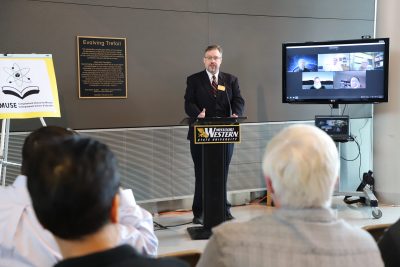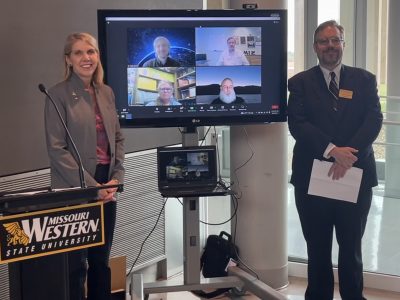
Dr. Jeff Woodford speaks about the NSF grant at a news conference on Oct. 4. Other members of the research team appeared via Zoom.
St. Joseph, Mo. —Oct. 4, 2023—Students at primarily undergraduate institutions in Missouri will soon have access to greater computing power, thanks to a National Science Foundation grant of nearly $700,000 awarded to Missouri Western State University and three other universities in the state.
“Students who graduate right now are going into a world where computational knowledge is assumed,” said Dr. Jeffrey Woodford, professor of chemistry at Missouri Western and principal investigator for the grant. “This will raise the bar on computer literacy. The world is awash with data, and giving our students the tools to work with that data in a meaningful way is vital.”
The $693,923 grant from the NSF creates the Computational Infusion for Missouri Undergraduate Science and Engineering, composed of Missouri Western, Southeast Missouri State University, Truman State University and Webster University along with the Missouri Research and Education Network (MOREnet) and the University of Missouri System Research Support Services. The consortium will install a high-performance computing cluster that will allow users to process large quantities of data and perform highly complex calculations much faster than a typical desktop or laptop computer.
“There is a growing demand for high-performance computing skills in the workforce,” said Dr. Baoqiang Yan, professor of computer science, who helped to formulate the proposal and is listed as senior personnel on the grant. “This grant will help our students gain interest and maybe even pursue a career in this exciting field.”

Dr. Elizabeth Kennedy, Missouri Western’s president, with Dr. Woodford and the research team.
“As Missouri’s applied learning university, Missouri Western is thrilled to be able to offer undergraduate students the opportunity to use computing power that is ordinarily available only at major research institutions, and frequently reserved primarily for faculty and post-graduate students even there,” said Dr. Elizabeth Kennedy, Missouri Western’s president.
The 20 nodes in the cluster will be housed at the University of Missouri-Columbia. Priority access will be granted to consortium members comprised of primarily undergraduate institutions in the state. Students and faculty will be able to use the computing power for research and educational exercises. The goal is that this statewide project can be replicated nationwide.
“One of the things that’s really exciting about this project is that high performance computing will be directly incorporated into the classroom,” said Dr. Laura Reynolds, provost and vice president for academic affairs. “This will provide students with valuable experience and skills that they will be able to use after graduation, whether in industry or in graduate school.”
The project is interdisciplinary. Dr. Woodford is a chemist, as is co-principal investigator Dr. Marcus Bond from Southeast Missouri State. The other co-principal investigators are Dr. Xiaoyuan Suo of Webster University, a computer scientist, and Dr. Colin DeGraf of Truman State, a physicist. The focus is on STEM, but Dr. Woodford says high-performance computing will be available and have applications in almost any field. He could envision using the cluster to search and analyze large volumes of ancient texts in an English or history class, for example.
“I think every student when they leave here should have some idea of what’s going on ‘under the hood’ when it comes to computing and data science,” Dr. Woodford said.
The grant will give some promising students the opportunity to learn even more about high-performance computing. They will receive funding to attend a summer workshop and learn more about the subject, then come back to their home campuses as student leaders, possibly as teaching assistants.
The consortium hopes to have the high-performance computing cluster operational and available for use by Fall 2024.
Missouri Western State University is a student-centered learning community preparing individuals for lives of excellence through applied learning. Missouri Western is located in St. Joseph, Mo., and is committed to the educational, economic, cultural and social development of the region it serves. Visit missouriwestern.edu.
